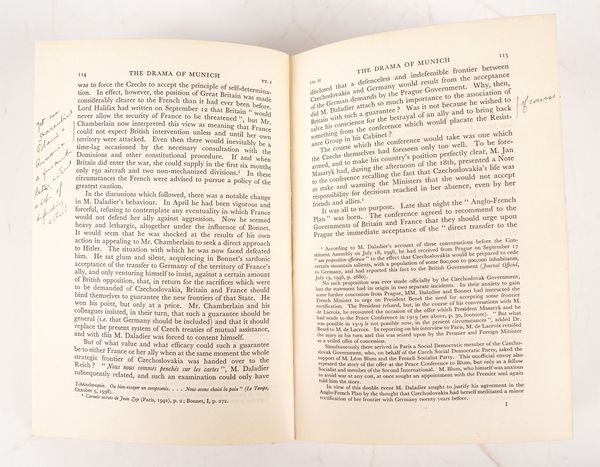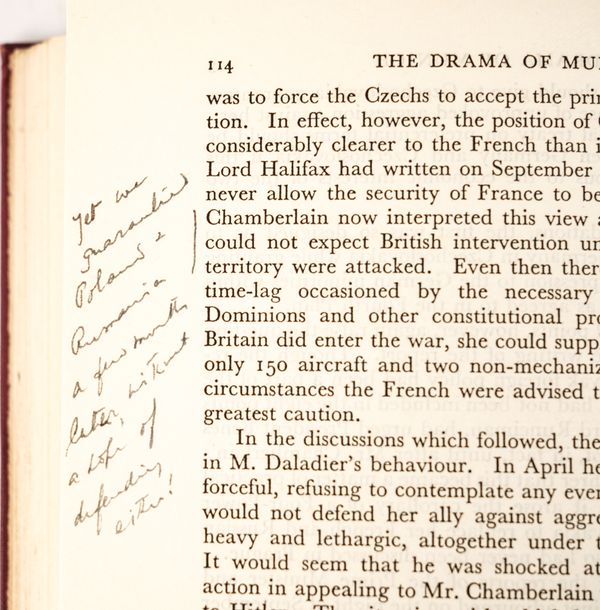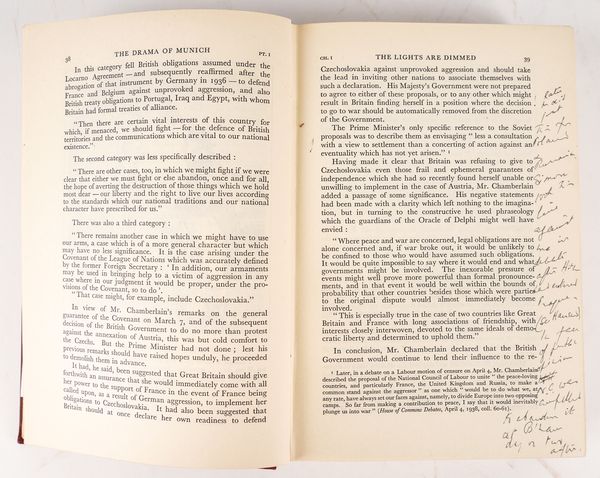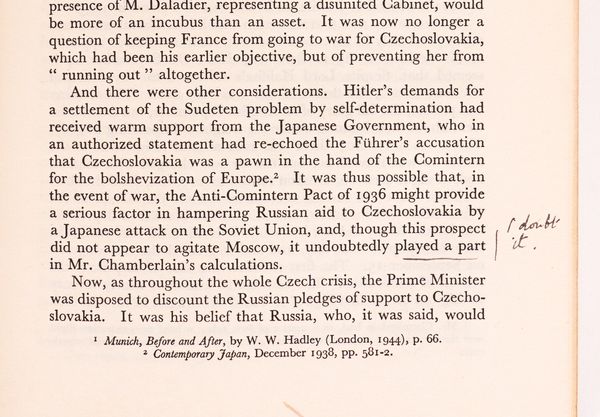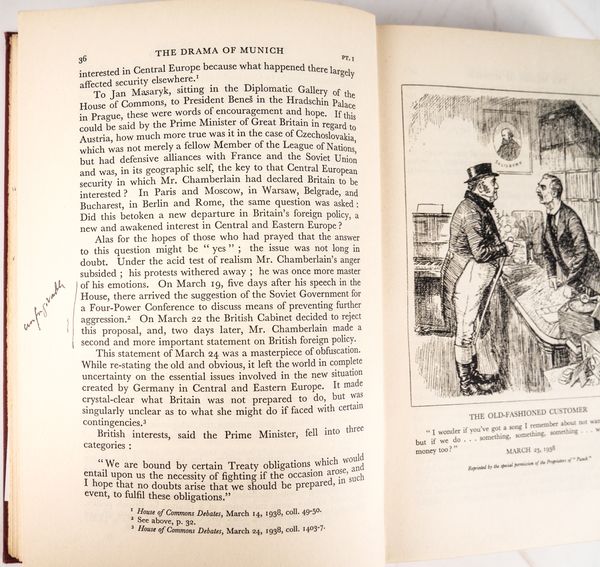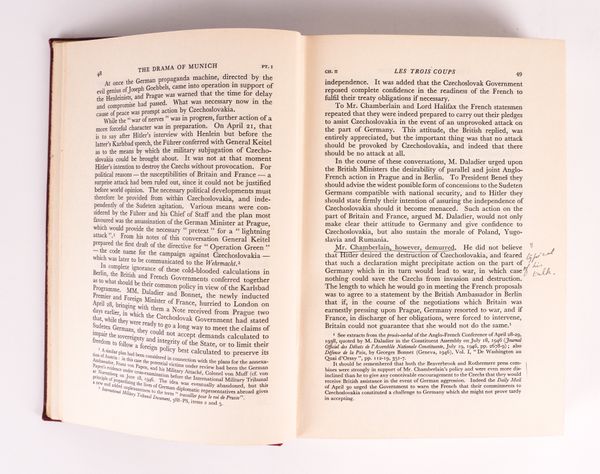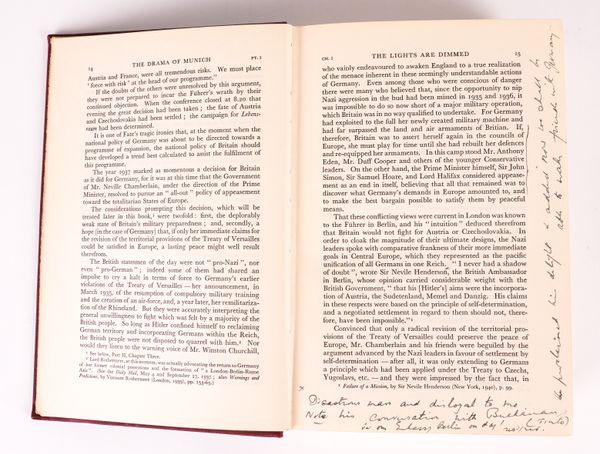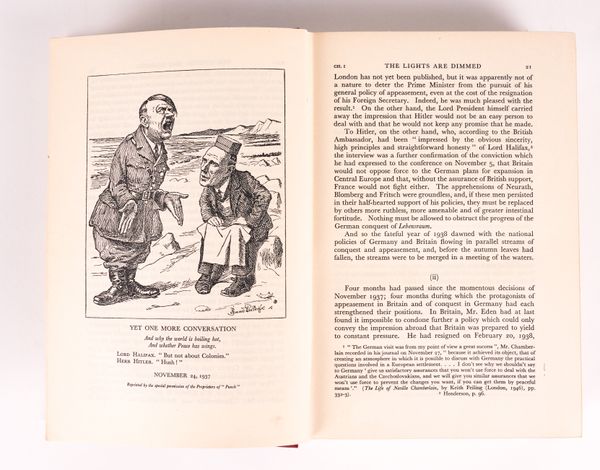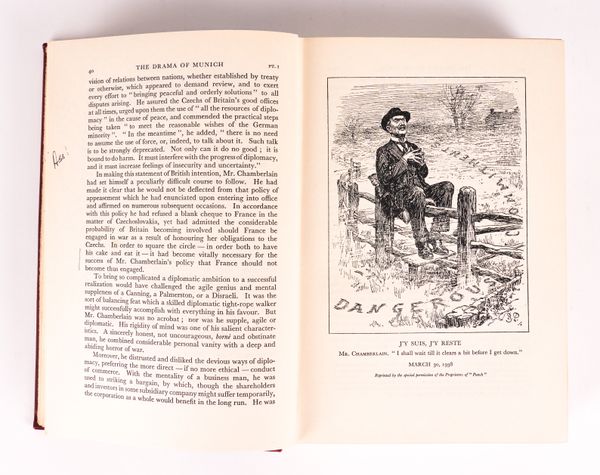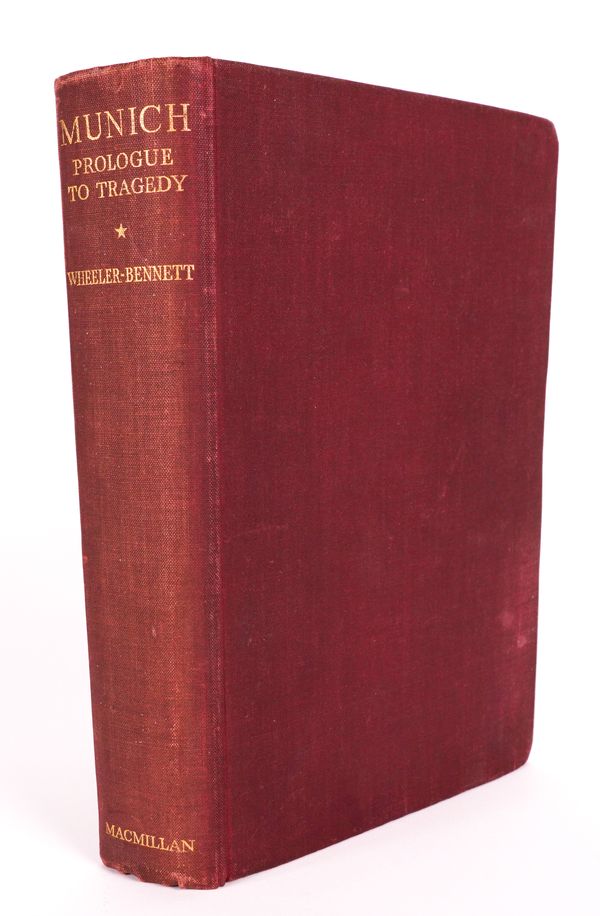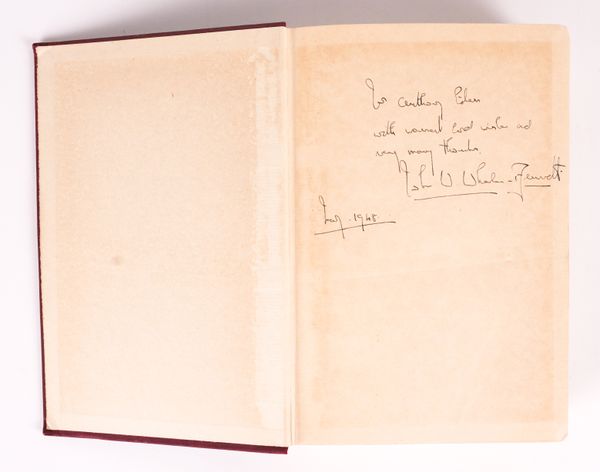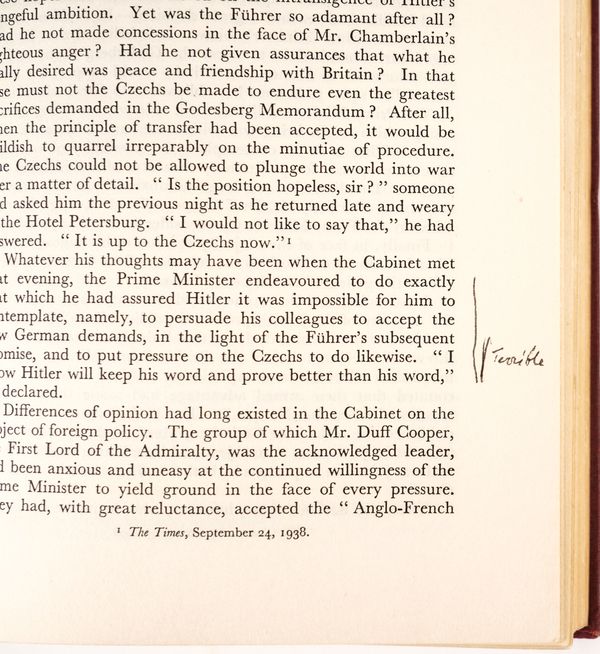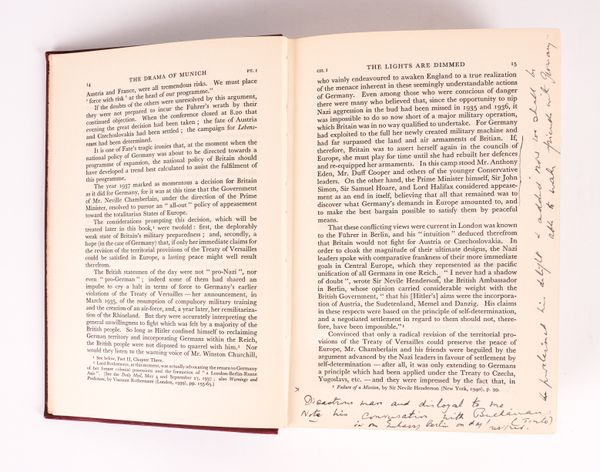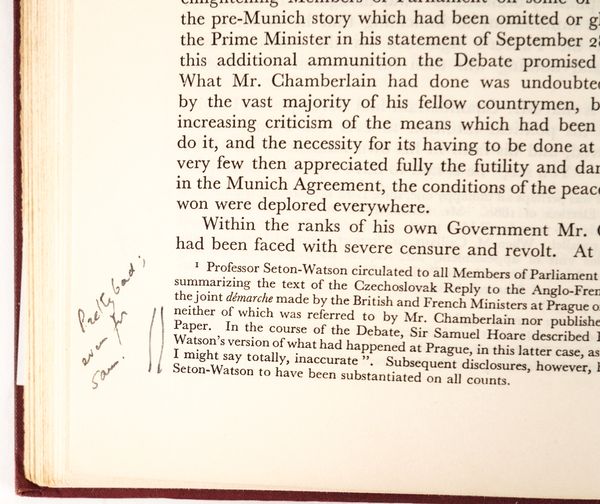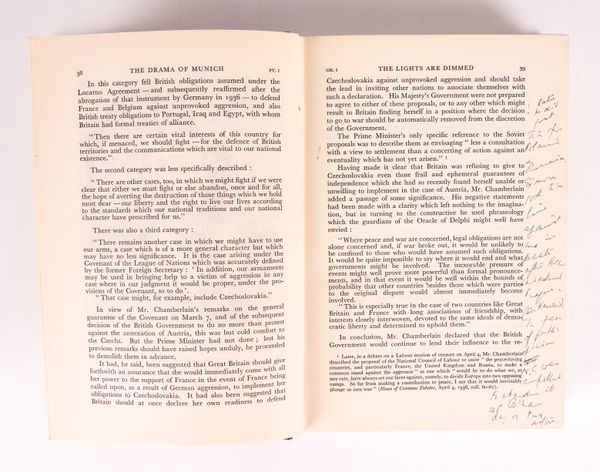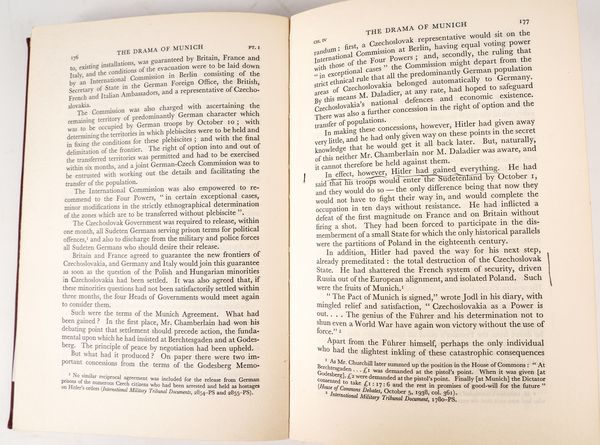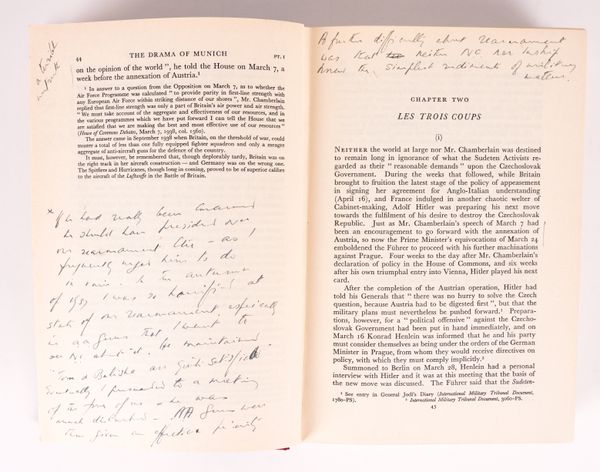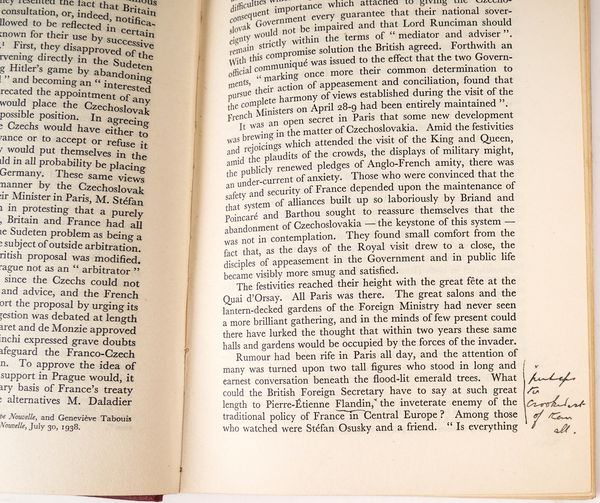WHEELER-BENNETT, John (1902-75). Munich. Prologue to Tragedy, London, 1948, 8vo, original cloth. FIRST EDITION, PRESENTATION COPY, A HIGHLY IMPORTANT COPY, ANNOTATED AND HIGHLIGHTED IN INK BY ANTHONY EDEN.
| Estimate: | £700 - £1,000 |
| Hammer price: | £750 |
WHEELER-BENNETT, John W. (1902-75). Munich. Prologue to Tragedy. London: Macmillan & Co., 1948. Large 8vo (220 x 150mm). Half title, 9 full-page illustrations of contemporary cartoons from "Punch" and the "Evening Standard", 3 folding maps (some faint staining to p.ix of the Foreword, one leaf creased at lower fore-corner with a short tear without loss). Original plum cloth, the spine lettered in gilt (some extremely light and inconspicuous staining, lacks dust-jacket). Provenance: Anthony Eden, 1st Earl of Avon (modern armorial bookplate loosely-inserted). FIRST EDITION, PRESENTATION COPY, the half title inscribed, "For Anthony Eden, with warmest best wishes and very many thanks, John W. Wheeler-Bennett, May, 1948." A HIGHLY IMPORTANT COPY, ANNOTATED AND HIGHLIGHTED IN INK BY ANTHONY EDEN, principally to the first half of the book. (It is very unusual for Eden's annotations to be in ink and not pencil.) For example, on p.15 (commenting on Sir Nevile Henderson, British Ambassador to Germany from 1937-39), Eden writes: "Disastrous man and disloyal to me. Note his conversation with Buchanan in our Embassy Berlin day 1 ... He proclaimed his delight & added now we shall be able to make friends with Germany"; on p.16 (commenting on a printed passage which reads 'Unheedful of the more cautious views of Mr. Eden, who, having formed a not wholly unfavourable view of Hitler when he first met him in 1934, had soon seen the light and realized the dangers of placing trust in Nazi pledges', and in which Eden has underlined the word 'soon'): "Rhineland did this for me"; on p.29 (commenting on the printed passage 'The Czech calculations had gone awry in that they had expected Schuschnigg's resistance to continue a year longer'): "Precisely my hope & calculation too. If N. C. [Neville Chamberlain] had been prepared to take advice it might have been"; on p.36 (commenting on the printed passage 'On March 22 [1938] the British Cabinet decided to reject this proposal [of the Soviet Government for a Four-Power Conference]): "unforgivably"; on p.39 (commenting on Neville Chamberlain's approach to Czechoslovakia): "Later he did this for Poland & Rumania. [Sir John] Simon took his line against me in debate after Hitler had entered Prague (see Hansard). In face of public opinion N. C. was compelled to abandon it at B'ham day or two after"; on p.40 (commenting on the lines quoting Chamberlain's assertion that "'In the meantime ... there is no need to assume the use of force, or, indeed, to talk about it'"): "Ass!"; on p.43 (commenting on Basil Newton, then the British Ambassador to Czechoslovakia): "Very weak man. Poor in Baghdad later"; also on p.43: "N. C. was smug about rearmament & took little direct interest. He left it to [Sir Thomas] Inskip who was well meaning but utterly [?]futile"; on p.44 (in response to Chamberlain's assertion to the House of Commons that 'The almost terrifying power that Britain is building up has a sobering effect on the opinion of the world'): "a terrible untruth"; on pp.44-45 (on Chamberlain) he writes, in an extensive note that fills two thirds of a largely blank page: "If he had really been concerned he should have presided over our rearmament [illegible word] - as I frequently urged him to do in vain. In the autumn of 1937 I was so horrified at state [sic] of our rearmament especially in [illegible word] that I went to see N. C. about it. He maintained Tom [Inskip] & [Leslie Hore-] Belisha are quite satisfied. Eventually I [?]persuaded to a meeting of the three of us & he was much disturbed. [?]A. A. [i.e. Anti-Aircraft] guns were thus given an effective priority. A further difficulty about rearmament was that neither N. C. nor Inskip knew the simplest rudiments of military matters"; on p.49 (commenting on the line 'Mr. Chamberlain, however, demurred'): "Typical of his talk"; on p.73 (commenting on Pierre-Etienne Flandin, former Prime Minister of France): "Perhaps the crookedest of them all"; on p.75 (the context unclear): "Also intended to silence criticism here, no doubt"; on p.105 (commenting on the printed passage 'It was thus possible that, in the event of war, the Anti-Comintern Pact of 1936 might provide a serious factor in hampering Russian aid to Czechoslovakia by a Japanese attack on the Soviet Union, and, though this prospect did not appear to agitate Moscow, it undoubtedly played a part in Mr Chamberlain's calculations'): "I doubt it"; on p.106 (commenting on the printed passage 'It was his [Neville Chamberlain's] belief that Russia, who, it was said, would like nothing better than to see the capitalist States at each other's throats, would either not fight at all ... or, if she did fight, would, by reason of the bad state of her armaments and the difficulties of logistics, be able to offer little of value in the way of assistance'): "N. C. thought Russia quite useless militarily; he wasn't alone in that. What is less excusable is that he thought Italy militarily [?]formidable encouraged [?]thereto by weak & woolly [followed by two illegible words]"; on p.114 (commenting on the printed passage 'Chamberlain now interpreted this view as meaning that France could not expect British intervention unless and until her own territory were attacked'): "Yet we guaranteed Poland & Rumania a few months later, without a hope of defending either!"; on p.174 (commenting on Sir Horace Wilson): "A very bad man"; whereupon the annotation largely ceases, except that, on p.177, Eden - as if in disgust - boldly highlights and underlines the printed sentence 'In effect, however, Hitler had gained everything.'
